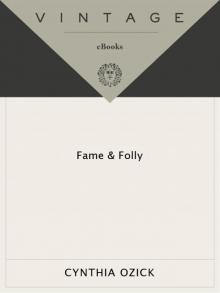- Home
- Cynthia Ozick
The Puttermesser Papers
The Puttermesser Papers Read online
THE PUTTERMESSER PAPERS
Fiction by Cynthia Ozick:
Foreign Bodies
Dictation
Heir to the Glimmering World
The Puttermesser Papers
The Shawl
The Messiah of Stockholm
The Cannibal Galaxy
Levitation: Five Fictions
Bloodshed and Three Novellas
The Pagan Rabbi and Other Stories
Trust
First published in the United States of America in 1997 by
Alfred A. Knopf, Inc.
This edition published in Great Britain in 2014 by Atlantic Books, an
imprint of Atlantic Books Ltd.
Copyright © Cynthia Ozick, 1997
The moral right of Cynthia Ozick to be identified as the author of this work has been asserted by her in accordance with the Copyright, Designs and Patents Act of 1988.
All rights reserved. No part of this publication may be reproduced, stored in a retrieval system or transmitted in any form or by any means, electronic, mechanical, photocopying, recording or otherwise, without the prior permission of both the copyright owner and the above publisher of this book.
This novel is entirely a work of fiction. The names, characters and incidents portrayed in it are the work of the author’s imagination and not to be construed as real. Any resemblance to actual persons, living or dead, events or localities, is entirely coincidental.
10 9 8 7 6 5 4 3 2 1
A CIP catalogue record for this book is available from the British Library.
Paperback ISBN: 978 0 85789 979 8
E-Book ISBN: 978 0 85789 980 4
Printed in Great Britain
Atlantic Books
An Imprint of Atlantic Books Ltd
Ormond House
26–27 Boswell Street
London WC1N 3JZ
www.atlantic-books.co.uk
FOR
Elaine, Esther,
Francine, Gloria, Helen,
Johanna, Lore,
Merrill, Norma, Sarah,
Susan, Susanne
Contents
Puttermesser: Her Work History, Her Ancestry, Her Afterlife
Chapter One
Puttermesser and Xanthippe
I. Puttermesser’s Brief Love Life, Her Troubles, Her Titles
II. Puttermesser’s Fall, and the History of the Genus Golem
III. The Golem Cooks, Cleans, and Shops
IV. Xanthippe At Work
V. WHY THE GOLEM WAS CREATED; Puttermesser’s Purpose
VI. Mayor Puttermesser
VII. Rappoport’s Return
VIII. Xanthippe Lovesick
IX. The Golem Destroys Her Maker
X. The Golem Snared
XI. The Golem Undone, and the Babbling of Rappoport
XII. Under the Flower Beds
Puttermesser Paired
I. An Age of Divorce
II. The Night Readers
III. The Unspeakable Joy
IV. The Awful Discrepancy
V. The Honeymoon
VI. The Marriage
Puttermesser and the Muscovite Cousin
I. History
II. A Joke out of Moscow
III. A Soviet Martian
IV. The Great Exposition
V. More History
VI. Interviews
VII. Another Interview
VIII. Entrepreneurs
IX. The Idealists
X. A Tea Party
XI. The Farewell
XII. Letters
Puttermesser in Paradise
Chapter One
Note on the Author
Flaubert does not build up his characters, as did Balzac, by objective, external description; in fact, so careless is he of their outward appearance that on one occasion he gives Emma brown eyes; on another deep black eyes; and on another blue eyes.
—A comment by Dr. Enid Starkie,
quoted (disapprovingly) in Flaubert’s
Parrot, by Julian Barnes
THE
PUTTERMESSER
PAPERS
Puttermesser:
Her Work History,
Her Ancestry, Her Afterlife
Puttermesser and Xanthippe
Puttermesser Paired
Puttermesser and the Muscovite Cousin
Puttermesser in Paradise
PUTTERMESSER:
HER WORK HISTORY,
HER ANCESTRY,
HER AFTERLIFE
PUTTERMESSER WAS THIRTY-FOUR, A lawyer. She was also something of a feminist, not crazy, but she resented having “Miss” put in front of her name; she thought it pointedly discriminatory; she wanted to be a lawyer among lawyers. Though she was no virgin she lived alone, but idiosyncratically—in the Bronx, on the Grand Concourse, among other people’s decaying old parents. Her own had moved to Miami Beach; in furry slippers left over from high school she roamed the same endlessly mazy apartment she had grown up in, her aging piano sheets still on top of the upright with the teacher’s X marks on them showing where she should practice up to. Puttermesser always pushed a little ahead of the actual assignment; in school too. Her teachers told her mother she was “highly motivated,” “achievement oriented.” Also she had “scholastic drive.” Her mother wrote all these things down in a notebook, kept it always, and took it with her to Florida in case she should die there. Puttermesser had a younger sister who was also highly motivated, but she had married an Indian, a Parsee chemist, and gone to live in Calcutta. Already the sister had four children and seven saris of various fabrics.
Puttermesser went on studying. In law school they called her a grind, a competitive-compulsive, an egomaniac out for aggrandizement. But ego was no part of it; she was looking to solve something, she did not know what. At the back of the linen closet she found a stack of her father’s old shirt cardboards (her mother was provident, stingy: in kitchen drawers Puttermesser still discovered folded squares of used ancient waxed paper, million-creased into whiteness, cheese-smelling, nesting small unidentifiable wormlets); so behind the riser pipe in the bathroom Puttermesser kept weeks’ worth of Sunday Times crossword puzzles stapled to these laundry boards and worked on them indiscriminately. She played chess against herself, and was always victor over the color she had decided to identify with. She organized tort cases on index cards. It was not that she intended to remember everything: situations—it was her tendency to call intellectual problems “situations”—slipped into her mind like butter into a bottle.
A letter came from her mother in Florida:
Dear Ruth,
I know you won’t believe this but I swear it’s true the other day Papa was walking on the Avenue and who should he run into but Mrs. Zaretsky, the thin one from Burnside not the stout one from Davidson, you remember her Joel? Well he’s divorced now no children thank God so he’s free as a bird as they say his ex the poor thing couldn’t conceive. He had tests he’s O.K. He’s only an accountant not good enough for you because God knows I never forget the day you made Law Review but you should come down just to see what a tender type he grew into. Every tragedy has its good side Mrs. Zaretsky says he comes down now practically whenever she calls him long distance. Papa said to Mrs. Zaretsky well, an accountant, you didn’t over-educate your son anyhow, with daughters it’s different. But don’t take this to heart honey Papa is as proud as I am of your achievements. Why don’t you write we didn’t hear from you too long busy is busy but parents are parents.
Puttermesser had a Jewish face and a modicum of American distrust of it. She resembled no poster she had ever seen: she hated the Breck shampoo girl, so blond and bland and pale-mouthed; she boycotted Breck because of the golden-haired poster
s, all crudely idealized, an American wet dream in the subway. Puttermesser’s hair came in bouncing scallops—layered waves from scalp to tip, like imbricated roofing tile. It was nearly black and had a way of sometimes sticking straight out. Her nose had thick, well-haired, uneven nostrils, the right one noticeably wider than the other. Her eyes were small, the lashes short, invisible. She had the median Mongol lid—one of those Jewish faces with a vaguely Oriental cast. With all this, it was a fact she was not bad-looking. She had a good skin with, so far, few lines or pits or signs of looseness-to-come. Her jaw was pleasing—a baby jowl appeared only when she put her head deep in a book.
In bed she studied Hebrew grammar. The permutations of the triple-lettered root elated her: how was it possible that a whole language, hence a whole literature, a civilization even, should rest on the pure presence of three letters of the alphabet? The Hebrew verb, a stunning mechanism: three letters, whichever fated three, could command all possibility simply by a change in their pronunciation, or the addition of a wing-letter fore and aft. Every conceivable utterance blossomed from this trinity. It seemed to her not so much a language for expression as a code for the world’s design, indissoluble, predetermined, translucent. The idea of the grammar of Hebrew turned Puttermesser’s brain into a palace, a sort of Vatican; inside its corridors she walked from one resplendent triptych to another.
She wrote her mother a letter refusing to come to Florida to look over the divorced accountant’s tenderness. She explained her life again; she explained it by indirection. She wrote:
I have a cynical apperception of power, due no doubt to my current job. You probably haven’t heard of the Office for Visas and Registration, OVIR for short. It’s located on Ogaryova Street, in Moscow, USSR. I could enumerate for you a few of the innumerable bureaucratic atrocities of OVIR, not that anyone knows them all. But I could give you a list of the names of all those criminals, down to the women clerks, Yefimova, Korolova, Akulova, Arkhipova, Izrailova, all of them on Kolpachni Street in an office headed by Zolotukhin, the assistant to Colonel Smyrnov, who’s under Ovchinikov, who is second in command to General Viryein, only Viryein and Ovchinikov aren’t on Kolpachni Street, they’re the ones in the head office—the M.D.V., Internal Affairs Ministry—on Ogaryova Street. Some day all the Soviet Jews will come out of the spider’s clutches of these people and be free. Please explain to Papa that this is one of the highest priorities of my life at this time in my personal history. Do you think a Joel Zaretsky can share such a vision?
Immediately after law school, Puttermesser entered the firm of Midland, Reid & Cockleberry. It was a blueblood Wall Street firm, and Puttermesser, hired for her brains and ingratiating (read: immigrant-like) industry, was put into a back office to hunt up all-fours cases for the men up front. Though a Jew and a woman, she felt little discrimination: the back office was chiefly the repository of unmitigated drudgery and therefore of usable youth. Often enough it kept its lights burning till three in the morning. It was right that the Top Rung of law school should earn you the Bottom of the Ladder in the actual world of all-fours. The wonderful thing was the fact of the Ladder itself. And though she was the only woman, Puttermesser was not the only Jew. Three Jews a year joined the back precincts of Midland, Reid (four the year Puttermesser came, which meant they thought “woman” more than “Jew” at the sight of her). Three Jews a year left—not the same three. Lunchtime was difficult. Most of the young men went to one or two athletic clubs nearby to work out; Puttermesser ate from a paper bag at her desk, along with the other Jews, and this was strange: the young male Jews appeared to be as committed to the squash courts as the others. Alas, the athletic clubs would not have them, and this too was preternatural—the young Jews were indistinguishable from the others. They bought the same suits from the same tailors, wore precisely the same shirts and shoes, were careful to avoid tie clips and to be barbered a good deal shorter than the wild men of the streets, though a bit longer then the prigs in the banks.
Puttermesser remembered what Anatole France said of Dreyfus: that he was the same type as the officers who condemned him. “In their shoes he would have condemned himself.”
Only their accents fell short of being identical: the “a” a shade too far into the nose, the “i” with its telltale elongation, had long ago spread from Brooklyn to Great Neck, from Puttermesser’s Bronx to Scarsdale. These two influential vowels had the uncanny faculty of disqualifying them for promotion. The squash players, meanwhile, moved out of the back offices into the front offices. One or two of them were groomed—curried, fed sugar, led out by the muzzle—for partnership: were called out to lunch with thin and easeful clients, spent an afternoon in the dining room of one of the big sleek banks, and, in short, developed the creamy cheeks and bland habits of the always-comfortable.
The Jews, by contrast, grew more anxious, hissed together meanly among the urinals (Puttermesser, in the ladies’ room next door, could hear malcontent rumblings in the connecting plumbing), became perfectionist and uncasual, quibbled bitterly, with stabbing forefingers, over principle, and all in all began to look and act less like superannuated college athletes and more like Jews. Then they left. They left of their own choice; no one shut them out.
Puttermesser left too, weary of so much chivalry—the partners in particular were excessively gracious to her, and treated her like a fellow-aristocrat. Puttermesser supposed this was because she did not say “a” in her nose or elongate her “i”, and above all she did not dentalize her “t,” “d,” or “l,” keeping them all back against the upper palate. Long ago her speech had been standardized by the drilling of fanatical teachers, elocutionary missionaries hired out of the Midwest by Puttermesser’s prize high school, until almost all the regionalism was drained out; except for the pace of her syllables, which had a New York deliberateness, Puttermesser could have come from anywhere. She was every bit as American as her grandfather in his captain’s hat. From Castle Garden to blue New England mists, her father’s father, hat-and-neckwear peddler to Yankees! In Puttermesser’s veins Providence, Rhode Island, beat richly. It seemed to her the partners felt this.
Then she remembered that Dreyfus spoke perfect French, and was the perfect Frenchman.
For farewell she was taken out to a public restaurant—the clubs the partners belonged to (they explained) did not allow women—and apologized to.
“We’re sorry to lose you,” one said, and the other said, “No one for you in this outfit for under the canvas, hah?”
“The canvas?” Puttermesser said.
“Wedding canopy,” said the partner, with a wink. “Or do they make them out of sheepskin—I forget.”
“An interesting custom. I hear you people break the dishes at a wedding too,” said the second partner.
An anthropological meal. They explored the rites of her tribe. She had not known she was strange to them. Their beautiful manners were the cautiousness you adopt when you visit the interior: Dr. Livingstone, I presume? They shook hands and wished her luck, and at that moment, so close to their faces with those moist smile-ruts flowing from the sides of their waferlike noses punctured by narrow, even nostrils, Puttermesser was astonished into noticing how strange they were—so many luncheon martinis inside their bellies, and such beautiful manners even while drunk, and, important though they were, insignificant though she was, the fine ceremonial fact of their having brought her to this carpeted place. Their eyes were blue. Their necks were clean. How closely they were shaven!—like men who grew no hair at all. Yet hairs curled inside their ears. They let her take away all her memo pads with her name printed on them. She was impressed by their courtesy, their benevolence, through which they always got their way. She had given them three years of meticulous anonymous research, deep, deep nights going after precedents, dates, lost issues, faded faint politics; for their sakes she had yielded up those howling morning headaches and half a diopter’s worth of sight in both eyes. Brilliant students make good aides. They were pleased though
not regretful. She was replaceable: a clever black had been hired only that morning. The palace they led her to at the end of it all was theirs by divine right: in which they believed, on which they acted. They were benevolent because benevolence was theirs to dispense.
She went to work for the Department of Receipts and Disbursements. Her title was Assistant Corporation Counsel—it had no meaning, it was part of the subspeech on which bureaucracy relies. Of the many who held this title most were Italians and Jews, and again Puttermesser was the only woman. In this great City office there were no ceremonies and no manners: gross shouts, ignorant clerks, slovenliness, litter on the floors, grit stuck all over antiquated books. The ladies’ room reeked: the women urinated standing up, and hot urine splashed on the toilet seats and onto the muddy tiles.
The successive heads of this department were called Commissioners. They were all political appointees—scavengers after spoils. Puttermesser herself was not quite a civil servant and not quite not a civil servant—one of those amphibious creatures hanging between base contempt and bare decency; but she soon felt the ignominy of belonging to that mean swarm of City employees rooted bleakly in cells inside the honeycomb of the Municipal Building. It was a monstrous place, gray everywhere, abundantly tunneled, with multitudes of corridors and stairs and shafts, a kind of swollen doom through which the bickering of small-voiced officials whinnied. At the same time there were always curious farm sounds—in the summer the steady cricket of the air-conditioning, in the winter the gnash and croak of old radiators. Nevertheless the windows were broad and high and stupendously filled with light; they looked out on the whole lower island of Manhattan, revealed as an island, down to the Battery, all crusted over with the dried lava of shape and shape: rectangle over square, and square over spire. At noon the dark gongs of St. Andrew’s boomed their wild and stately strokes.
To Puttermesser all this meant she had come down in the world. Here she was not even a curiosity. No one noticed a Jew. Unlike the partners at Midland, Reid, the Commissioners did not travel out among their subjects and were rarely seen. Instead they were like shut-up kings in a tower, and suffered from rumors.

 Antiquities
Antiquities Fame & Folly
Fame & Folly The Messiah of Stockholm
The Messiah of Stockholm Critics, Monsters, Fanatics, and Other Literary Essays
Critics, Monsters, Fanatics, and Other Literary Essays Heir to the Glimmering World
Heir to the Glimmering World The Din in the Head
The Din in the Head Dictation
Dictation The Puttermesser Papers
The Puttermesser Papers Metaphor and Memory
Metaphor and Memory Art and Ardor
Art and Ardor Foreign Bodies
Foreign Bodies Quarrel & Quandary
Quarrel & Quandary